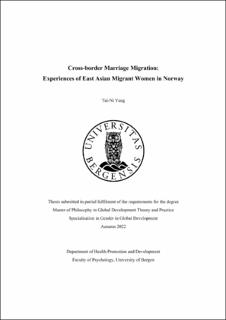| dc.description.abstract | As the field of gender and migration advances, the implications of gender on transnational migration and how migration affects gender relations transnationally require more nuanced investigation. This study seeks to understand how gender relations in the origin country affect East Asian women’s cross- border marriage, to what extent their gender perceptions are influenced by the Norwegian gender equality ideal, and what constraints they face in Norwegian society. This study adopted gender structure theory with an intersectional analytical perspective to investigate how gender, as a multilevel and multidimensional structure, intersects with class and ethnicity in shaping East Asian women’s experiences in Norway. The concept of empowerment was used to address the (dis)empowering effects and agency the participants have in various aspects. This is a qualitative study with ethnographic approach. Data was collected through 12 in-depth semi-structured interviews with eleven participants who were originally from China, Korea, and Taiwan and now live in Bergen, Norway. The collected data were coded and analysed using Braun and Clarke’s (2022) reflexive thematic analysis. The findings suggest both cultural norms and gender role expectations in the origin country and structural factors such as child welfare, egalitarian values, and migration rules in Norway play a role in the formation of East Asian women’s cross-border marriage migration. Overall, there is a more egalitarian relationship in their familial structures, but their immigrant status limits migrant women’s agency. Further, the change and continuities between traditional gender role expectations and gender equality ideals reveal an iterative process in which negotiation and redefining of gender roles and femininities take place. The participants’ narratives demonstrated that Norwegian gender equality ideology and social norms can be empowering in one aspect but constraining in another. Finally, a common pattern of underemployment, experiences of structural discrimination, and exclusion in employment and the workplace are found among these highly educated East Asian migrant women. However, some cases also show their resistance of using social resources and traditional gendered roles strategically to operate agency and prioritise their aspiration. By examining the interplay of structural factors and individual’s agency with an intersectional and gender perspective, this study contributes to a more complex and nuanced account of East Asian women’s life experiences beyond the dichotomous assumptions of reproducing versus transforming traditional gender relations and oppressed victims versus emancipated/empowered women in the discourses of cross-border marriage migration. | |
